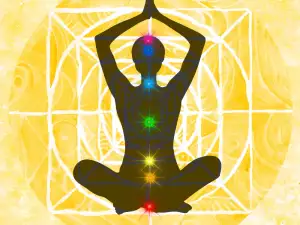Meditation seems to be one of the most mysterious concepts in esotericism. Many and varied are the definitions given for meditation. In the Oxford English Dictionary it is described as "a private exercise of prayer, which consists in a prolonged directing of the mind to the contemplation of some religious truth, sacrament, or object of reverence, with the object of elevating the spirit through Divine love and holiness of life." Another, less popular definition is "to fix one's attention on something, to observe with interest or aimlessness."
In reality, meditation is an active process in which one focuses on a topic or experience. This develops the skill of contemplation, reflection and self-observation. One learns to be fully present in the present and unconditionally accept oneself and reality, instead of wandering between accusations of something past and fear of the future. Consciousness becomes more flexible and open. The world is seen more clearly and one can react more effectively.
The deeper and longer a person remains in a state of meditation, the more they develop their intuition and the more successfully they cope with the tasks of everyday life, because the view of the events in life becomes wider and deeper. If we are to compare meditation to reading a book, it is "reading between the lines" as opposed to literally taking the text or the events in the life of the uninitiated.
A necessary prerequisite for meditative practice is the acceptance as a belief that people are fundamentally good. Therefore, knowledge and understanding of natural laws is necessary. This is usually what those who have suffered a lot (physically and mentally) and have not found an answer to the questions they were worried about, because the truth about what is happening to us is beyond everything visible.
In short, the basic truths about our world that underlie the worldview of a person striving for improvement are:
1. The universe is mental; thought creates matter, therefore,
2. "You will reap what you sow"; if you hate, you will be hated; if you fear, you will attract to yourself what you fear; if you are inwardly confused, so will your actions be; if you show understanding and brotherly love to a person who hates you, you can transform their hatred into love, because
3. Everything vibrates; the way we vibrate affects others, turning them into resonators of the vibrational frequencies we emit.
4. Everything has two poles, two opposites; every truth is a half-truth; what is unwanted is killed by reversing the polarity. If we want to change scarcity into abundance, we must maintain the mental image of wealth, if we want to be healthy, we must focus on the thought of health. However, persistence is needed, because
5. Everything ebbs and flows, rises and falls.
6. Nothing happens by chance; everything has a definite cause and every cause produces its effect. Every wrong is punished and every good is rewarded. The reward or punishment is almost never of the same form, but necessarily of the same value, thus maintaining equilibrium in nature.
When one understands these truths, one strives to do the best one is capable of, fills oneself with the most positive thoughts and feelings, overcomes obstacles with understanding while maintaining inner harmony and peace. Every crisis situation can turn out to be a wonderful new beginning. We'll just have to see it. This is where meditation comes to the rescue.
In his book The Conscious Self, Andy James discusses several types of meditation. In enlightening meditation (vipassana) one concentrates not on a problem, but on one's physical sensations caused by inhaling and exhaling. The goal is to observe and perceive everything that happens without interference. Through this technique, a person learns self-absorption by isolating themself from what is happening around, self-control is formed. Gradually the mind becomes calm and wisdom and compassion increase. Everyday life is filled with new meaning.
Another type of meditation is concentration (samatha). The ultimate goal in it is a complete merging of the mind with its object. Samatha is the exact opposite of vipassana, where the mind remains open and receptive. One of the techniques for achieving concentration is counting breaths.

Meditation on universal love and mercy leads to the development of wisdom and compassion. The meditator focuses on the heart. Attention is directed first to the physical sensations of expansion and contraction brought about by the breath and then to a sense of the energy of love. After accumulating love, the meditator directs it towards himself by forgiving himself for all faults and then towards his loved ones, freeing himself from all bad feelings towards them and forgiving them. Gradually, the circle of people, whom we send our love to, may expand. Metta meditation ends with observing the breath.
Meditation can also be performed with a different purpose - healing or otherwise, starting with contemplation of the purpose and motivations for performing the meditation. Visualizing the desired image is accompanied by an emotional experience of satisfaction from the achieved goal and ends with an expression of gratitude for what has been achieved.
It is recommended that the meditation is done for a fixed time with a predetermined end, for example 20 minutes and a gradual increase in its duration. The body position is sitting with a straight back to ensure the free flow of energy through our body. The feet are resting on the floor or in a lotus position. Before meditation, relaxation exercises can be done to relax the body, until the tension is completely removed.
Meditation is entering more and more into the daily life of people from different countries. Until years ago, it was a priority for those living in eastern countries. But the busy daily life in developed economic countries and strong commercialization prompts more awake and aware people to seek balance, developing spiritually as well. In meditation the soul merges with the spirit, where peace, harmony, bliss reign.













